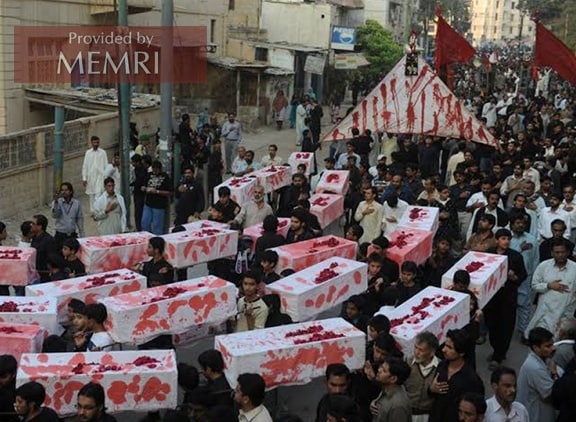
Shi'ites of Parachinar take out the bodies of their loved ones for burial. Image tweeted by @Mohtermalaila on July 28.
"Parachinar is Palestine of Pakistan where Shias [Shi'ites] are being killed just because of their religious identity," observed a Pakistani account on X on July 30, 2024.[1] The image above and those following are not from Gaza but from Parachinar in Pakistan where Shi'ite Muslims are being systematically targeted and killed in an ongoing massacre.
Parachinar is a Pakistani town situated along the border of Afghanistan, where the Pakistani Taliban, Lashkar-e-Jhangi, and other Sunni Islamist groups have been killing Shi'ite Muslims over the years. In Pakistan's Islamist culture, common Sunni Muslims often bring up fake charges against the religious minorities, including Shi'ites, Ahmadi Muslims, Christians, and Hindus, to stir up a hostile mob and seize their land and property.[2] In fact, the word aqliyat ("minority") has become a pejorative in Pakistani society.
In Parachinar, in July of this year, land disputes arose that quickly turned into a religious issue, and the minority Shi'ites are at the receiving end of systematic killings by a conglomerate of jihadi groups, including the Tehreek-e-Taliban Pakistan and Lashkar-e-Jhangvi, the latter being a dreaded organization known for specializing in killing Pakistani shi'ites. A land dispute between two tribes – the Malikhel, who are Shi'ite, and the Mangal, who are Sunni – of Madaki Kali in Boshehra village – reportedly turned deadly around July 27-28, and spread to the wider Kurram district, while the Sunni jihadi groups from neighboring Afghanistan also joined, resulting in clashes that killed 45 people and wounded hundreds.[3] Another reason the situation worsened this time was because the Pakistani-Afghan jihadi groups abducted Shi'ites, including a child, and beheaded as can be seen in a video shared on X.[4]
In a series of Urdu-language tweets dated July 29, Ittihadul Muslimeen, a Shi'ite group based in Jammu & Kashmir, demanded that the Pakistani government "break its criminal silence on the genocide of Shi'ites and do its moral and humanitarian duty."[5] Maulana Masoor Abbas Ansari, the leader of Ittihadul Muslimeen, warned: "The serious circumstances of Parachinar can prove to be dangerous for the integrity of the God-given state [of Pakistan] and it can be harbinger of a bigger destruction not only in Pakistan but in the entire Indian subcontinent."[6]
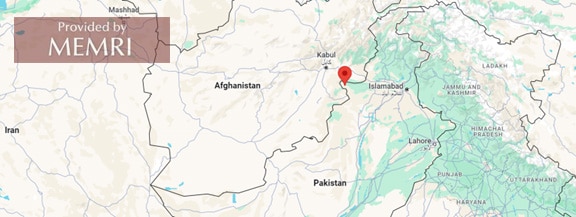
Parachinar is a Pakistani town (marked in red in the map) on the border with Afghanistan
The killing of Shi'ite Muslims in Parachinar is not an isolated incident. It is an ongoing massacre by Sunni groups. Since America and Israel are not involved, the world is not concerned, nor is Iran, the so-called supporter of Shi'ite Muslims, worried about them; in fact, Iran uses Pakistani Shi'ites to fight in Syria and Iraq, and elsewhere in the Middle East.[7] In July 2023, a year ago, a media report, titled "Parachinar becomes Pakistan's new conflict hotspot amid Shi'ite-Sunni clashes," noted that a similar dispute over land ownership saw the Sunni jihadi groups joining in the killing of nearly four dozen Shi'ites in Parachinar.[8]
The report noted that "the handlers of the Afghan jihad wanted to create a safe zone for fighters who could be launched into Afghanistan" and the issue in Parachinar "was not a sect-based conflict but a pre-planned move by the Tehreek-e-Taliban Pakistan (TTP) and the rabid anti-Shi'ite Lashkar-e-Jhangvi (LeJ) group to establish themselves in a Shi'ite-dominated region."[9] The reason the jihadi groups join in such killings is because they are driven by their ideological belief that Shi'ites are not Muslims – a belief held by almost all Sunni groups of South Asia.
These killings of Shi'ite Muslims have continued over the years while the Sunni Islamic state of Pakistan looks toward Palestine and Afghanistan. In 2014, the Pakistani military moved the fighters of the Haqqani Network to a neighboring area of Parachinar, and the Shi'ite community leaders were forced to accept the new situation.[10]
A historical timeline shows that attacks on Shi'ites in Pakistan may have started in the decade after the 1979 Islamic Revolution in Iran, whose theocratic regime exacerbated Shi'ite-Sunni tensions by sponsoring radical Shi'ite organizations in Pakistan and other Islamic countries.[11] The timeline shows how attacks on Shi'ites in Pakistan have happened regularly over the past few decades.[12]
Recent media reports show the recurring nature of the killings of Shi'ites in Parachinar. In September 2012, a car bomb killed more than a dozen Shi'ite Muslims in a Parachinar market and wounded scores of others.[13] In December 2015, more than two dozen Shi'ites were killed in a bomb blast.[14] In January and April 2017, a blast in a market and car bombing at an imambargah, a Shi'ite religious place and mosque, respectively, killed more than 50 Shi'ites and wounded hundreds of others.[15] In May 2023, Sunni terrorists killed eight people, including six teachers, "after identifying" them as Shi'ites.[16]
Amid the killings of Shi'ites at home, Pakistani religious and political leaders are more concerned over the developments in Palestine. In recent months, Pakistanis have called for boycott of Israel.[17] Shopkeepers in Pakistan have put up posters, stating that Israeli products are not available.[18] Jamaat-e-Islami Pakistan, the country's largest religious organization, and Jamiat Ulema-e-Islam (JUI-F), and other religious organizations have held anti-Israel protests in virtually every town and city in Pakistan.
In anti-Israel protests across Pakistan cities, senior Hamas leaders, including Khaled Mash'al and Ismail Haniyeh, who was killed on July 31, 2024, have spoken at public events by phone and in person.[19] Mash'al and his representative Dr. Naji Zuhair told protesters in Pakistan: "We have been continuing the jihad in a more confident manner than before"; "We will march further and enforce the shari'a of Muhammad... on this earth"; "We have pledged that we will expel the impious Israel from Palestine"; and "the Zionist enemy is weaker than a spider's web."[20]
Pakistani senator Mushtaq Ahmad Khan has called for a joint flotilla of ships from the Pakistani, Turkish, and Malaysian navies to be sent to Gaza.[21] Anwar-ul-Haq Kakar, speaking in his capacity as the acting prime minister of Pakistan before the 2024 elections, has said that accepting a "two-state solution to the Palestinian question does not at all mean accepting Israel as a separate state."[22] Shehbaz Sharif, the prime minister of Pakistan, has condemned "Israel's crimes and barbarity" in Gaza, saying: "Israel's thirst for shedding blood has not ended."[23]
At home, because the Pakistani military establishment supports the Sunni jihadi groups, the government of Pakistan has not been vocal in support of the minority Shi'ites being killed in Parachinar. But Pakistan's very public strategy on Palestine also has a dark legacy of a serious role in the killing of Palestinians. Brig.-Gen. Zia-ul-Haq, who would later become the military dictator of Pakistan and consciously shift the state of Pakistan on a jihadi path, was posted in Jordan as a military officer. His role in the killing of thousands of Palestinians, with some estimates putting the number at 10,000-25,000, during Black September of 1970, is not widely known among the Pakistani masses, though scholars write about it.[24]
A passage from Sarah Waheed's book, Hidden Histories of Pakistan, states: "In September 1970, Zia led Jordanian troops to crush a Palestinian uprising under King Hussain, and between five and seven thousand Palestinians were killed: the month became known as 'Black September'; Zia, however, was awarded the highest Jordanian honor, returning home to Pakistan in triumph, where he was promoted as a corps commander in Punjab."[25] A media report states: "Some reports claim that [Zia-ul-Haq] helped train the Jordanian army, and many even called him the 'butcher' of Palestinians."[26]
Following are images of Shi'ites killed in Parachinar in July 2024:
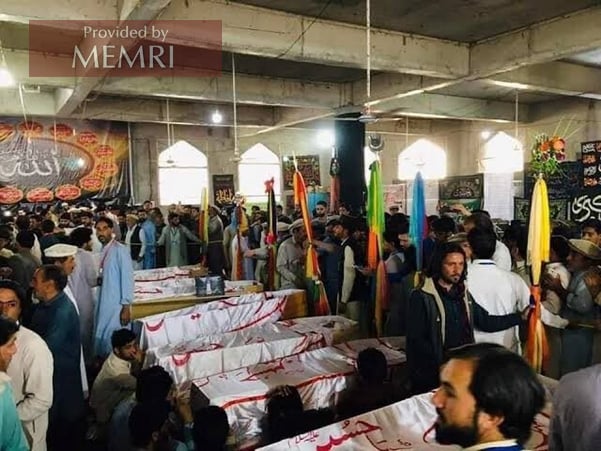
The bodies of the Shi'ites ready for burial. Image tweeted by @Mohtermalaila on July 28.
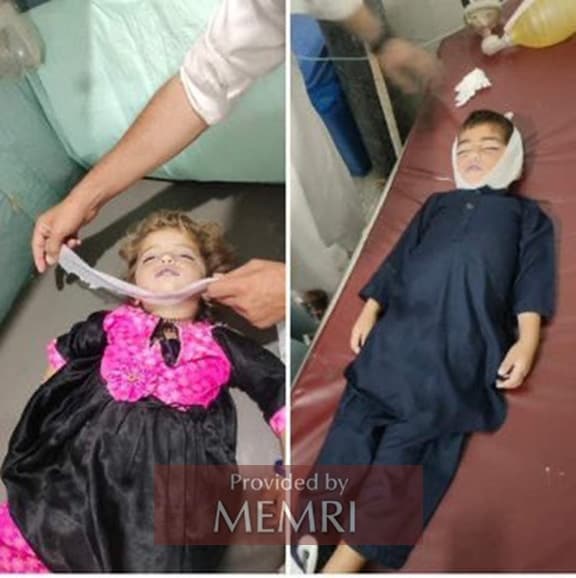
Image shared on X by @kamranalimir on July 28.
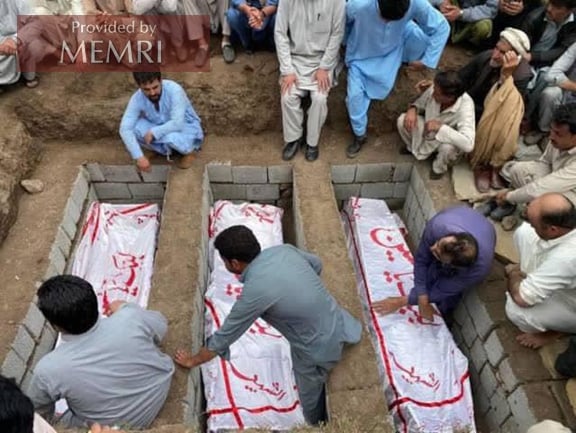
Shared on X by @SyedAli78771829.
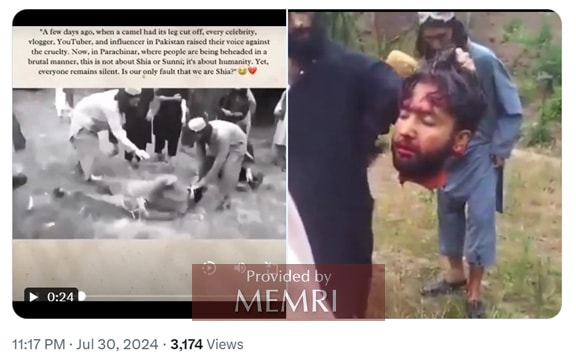
Shared on X by @ImBhatAaryan on July 30.
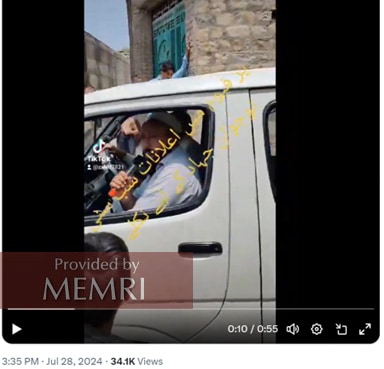
In the streets of Parachinar, a Sunni cleric announces on loudspeakers calling for jihad against Shi'ites. The video was shared by @aly_husein on X on July 28.
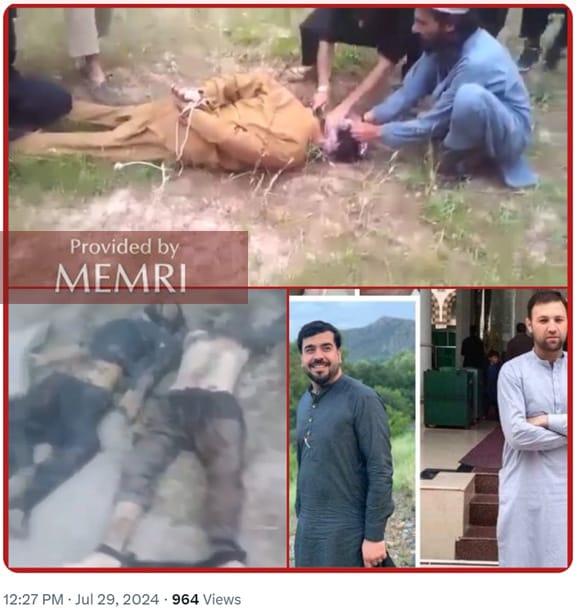
Shi'ites of Parachinar killed by Sunni groups. The image was shared on X by @@Tania_Kazim on July 29.
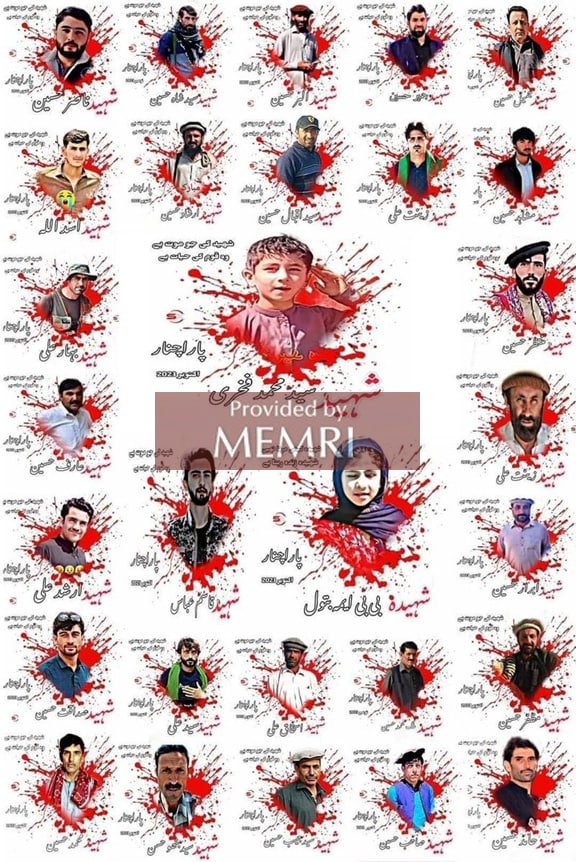
Twenty-nine Shi'ites, identified by name, killed in Parachinar. The graphic was shared by @MasroorAnsari on X on July 29.
* Tufail Ahmad is Senior Fellow for the MEMRI Islamism and Counter-Radicalization Initiative.
[1] X.com/Aestheticthemon, July 30, 2024.
[2] MEMRI Inquiry & Analysis Series No. 884, Calls To Put Pakistan On Genocide Watch Amid Mounting Persecution Of Its Religious Minorities, September 25, 2012.
[3] KashmirObserver.net (India), July 29, 2024.
[4] KashmirObserver.net (India), July 29, 2024.
[5] X.com/Ittihadul, July 29, 2024.
[6] X.com/Ittihadul, July 29, 2024.
[7] MEMRI Inquiry & Analysis Series No. 1777, As 50,000 Pakistani Shi'ite Pilgrims Go Missing In Iraq, Concern Deepens Over Iran's Continuing Recruitment Of Pakistani Shi'ites In Zainabiyoun Brigade To Fight In The Arab World, July 31, 2024.
[8] Siasat.com (India), July 12, 2023.
[9] Siasat.com (India), July 12, 2023.
[10] Thenews.com.pk (Pakistan), August 24, 2014.
[11] Dawn.com (Pakistan), December 4, 2012.
[12] Dawn.com (Pakistan), December 4, 2012.
[13] Tribune.com.pk (Pakistan), September 10, 2012.
[14] Dawn.com (Pakistan), December 14, 2015.
[15] Dawn.com (Pakistan), April 1, 2017.
[16] NYTimes.com (U.S.), May 4, 2023.
[17] MEMRI Special Dispatches Series No. 11317, Article In Pakistani Media Asks 'Boycotting Israel — Economic Activism Or Self-Harm?': Pakistan Saw 'Closure Of Roughly A Dozen Outlets Of Popular Western Companies In The Past Six Months, Accompanied By An Estimated Sales Decline Ranging From 20 Percent To 30 Percent', May 10, 2024.
[18] MEMRI Special Dispatches Series No. 11317, Article In Pakistani Media Asks 'Boycotting Israel — Economic Activism Or Self-Harm?': Pakistan Saw 'Closure Of Roughly A Dozen Outlets Of Popular Western Companies In The Past Six Months, Accompanied By An Estimated Sales Decline Ranging From 20 Percent To 30 Percent', May 10, 2024.
[19] MEMRI Inquiry & Analysis Series No. 1770, Anti-Israel Protests In Pakistani Cities – The Hamas Leaders' Engagements In Pakistan, June 5, 2024.
[20] MEMRI Special Dispatches Series No. 10928, Hamas Leader Khaled Mash'al Tells Conference In Pakistan: 'We Have Been Continuing Jihad In A More Confident Manner Than Before'; 'We Will March Further And Enforce The Shari'a Of Muhammad... On This Earth' – Dr. Naji Zuhair: 'We Have Pledged That We Will Expel The Unpious Israel From Palestine'; 'Zionist Enemy Is Even Weaker Than The Spider's Web', November 2, 2023.
[21] MEMRI Special Dispatches Series No. 11248, Former Pakistani Senator Mushtaq Ahmad Khan Calls For Joint Flotilla Of Pakistani, Turkish, And Malaysian Navies To Be Sent To Gaza: 'Are Prime Minister Shehbaz Sharif And Other Muslim Rulers Waiting For The Death Of The Last Palestinian?', April 3, 2024.
[22] MEMRI Special Dispatches Series No. 10844, Reactions In Pakistan To Hamas Attack In Israel – Pakistan's Caretaker Prime Minister Anwar-ul-Haq Kakar: 'The Two-State Solution Does Not At All Mean Accepting Israel As A Separate State'; Jamaat-e-Islami Pakistan: 'Israel Is A Constant Threat To International Peace And Is An Ulcer In The Chest Of The Civilized World', October 10, 2023.
[23] MEMRI Inquiry & Analysis Series No. 1770, Anti-Israel Protests In Pakistani Cities – The Hamas Leaders' Engagements In Pakistan, June 5, 2024.
[24] IndianExpress.com (India), November 11, 2023.
[25] X.com/AsimAli6, November 5, 2023.
[26] IndianExpress.com (India), November 11, 2023.








